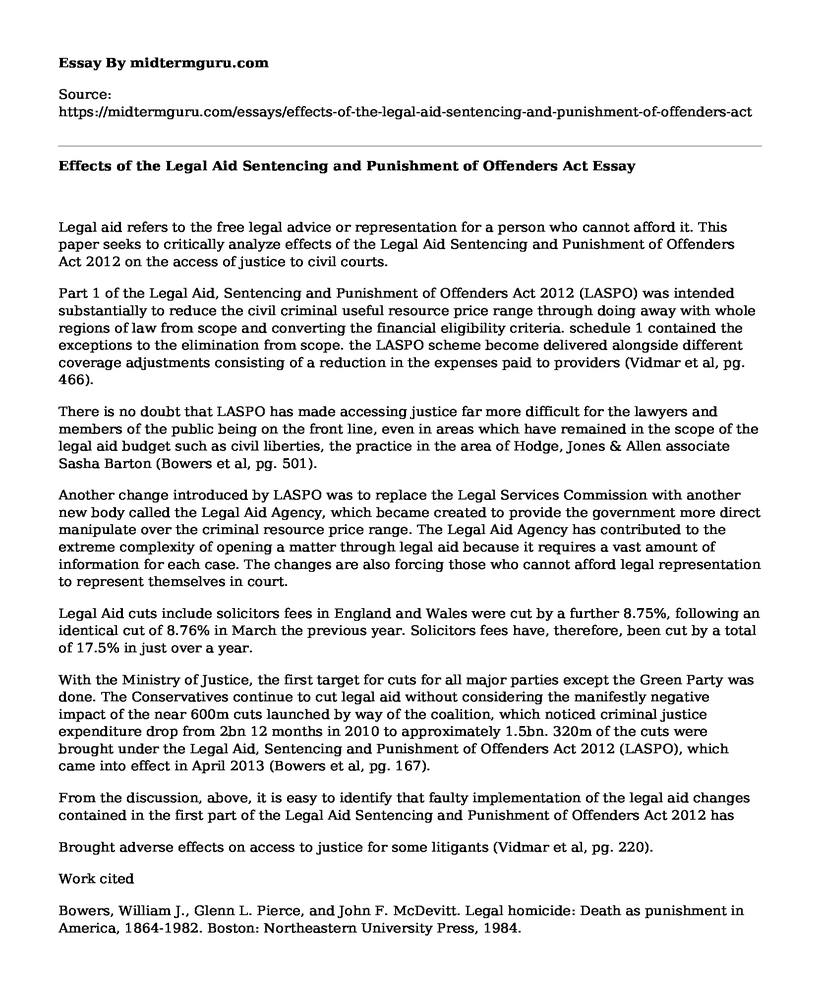Legal aid refers to the free legal advice or representation for a person who cannot afford it. This paper seeks to critically analyze effects of the Legal Aid Sentencing and Punishment of Offenders Act 2012 on the access of justice to civil courts.
Part 1 of the Legal Aid, Sentencing and Punishment of Offenders Act 2012 (LASPO) was intended substantially to reduce the civil criminal useful resource price range through doing away with whole regions of law from scope and converting the financial eligibility criteria. schedule 1 contained the exceptions to the elimination from scope. the LASPO scheme become delivered alongside different coverage adjustments consisting of a reduction in the expenses paid to providers (Vidmar et al, pg. 466).
There is no doubt that LASPO has made accessing justice far more difficult for the lawyers and members of the public being on the front line, even in areas which have remained in the scope of the legal aid budget such as civil liberties, the practice in the area of Hodge, Jones & Allen associate Sasha Barton (Bowers et al, pg. 501).
Another change introduced by LASPO was to replace the Legal Services Commission with another new body called the Legal Aid Agency, which became created to provide the government more direct manipulate over the criminal resource price range. The Legal Aid Agency has contributed to the extreme complexity of opening a matter through legal aid because it requires a vast amount of information for each case. The changes are also forcing those who cannot afford legal representation to represent themselves in court.
Legal Aid cuts include solicitors fees in England and Wales were cut by a further 8.75%, following an identical cut of 8.76% in March the previous year. Solicitors fees have, therefore, been cut by a total of 17.5% in just over a year.
With the Ministry of Justice, the first target for cuts for all major parties except the Green Party was done. The Conservatives continue to cut legal aid without considering the manifestly negative impact of the near 600m cuts launched by way of the coalition, which noticed criminal justice expenditure drop from 2bn 12 months in 2010 to approximately 1.5bn. 320m of the cuts were brought under the Legal Aid, Sentencing and Punishment of Offenders Act 2012 (LASPO), which came into effect in April 2013 (Bowers et al, pg. 167).
From the discussion, above, it is easy to identify that faulty implementation of the legal aid changes contained in the first part of the Legal Aid Sentencing and Punishment of Offenders Act 2012 has
Brought adverse effects on access to justice for some litigants (Vidmar et al, pg. 220).
Work cited
Bowers, William J., Glenn L. Pierce, and John F. McDevitt. Legal homicide: Death as punishment in America, 1864-1982. Boston: Northeastern University Press, 1984.
Vidmar, Neil, and Dale T. Miller. "Social psychological processes underlying attitudes toward legal punishment." Law and Society Review (1980): 565-602.
Cite this page
Effects of the Legal Aid Sentencing and Punishment of Offenders Act. (2021, May 21). Retrieved from https://midtermguru.com/essays/effects-of-the-legal-aid-sentencing-and-punishment-of-offenders-act
If you are the original author of this essay and no longer wish to have it published on the midtermguru.com website, please click below to request its removal:
- Essay on Freedom Now: How People Struggle for Equal Rights
- Essay Sample: Should US Prisoners Be Given Minimal or Extended Medical Care?
- How Women Testifying in Courts Should Be Treated - Paper Example
- Paper Example on Protecting the Youth From Challenges of Stop and Search Policies
- Women and Crime in the 18th Century and Their Status in Society in General - Essay Sample
- Article Analysis Essay on Ethical Challenges for Psychology in the Justice System
- US Laws: Protecting Citizens and Creating Harmony - Essay Sample







